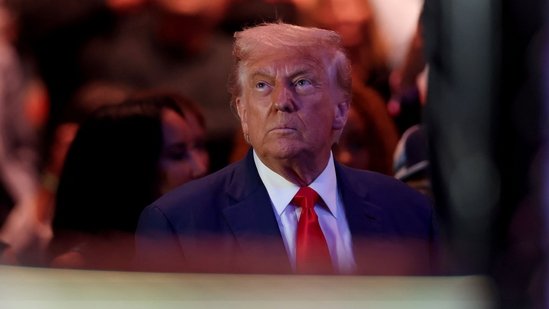THERE WAS a time, not long ago, when an important skill for journalists was translating the code in which powerful people spoke about each other. Carefully prepared speeches and other public remarks would be dissected for hints about the arguments happening in private. Among Donald Trump’s many achievements is upending this system. In his administration people seem to say exactly what they think at any given moment. Wild threats are made—to end habeas corpus; to take Greenland by force—without any follow-through. Journalists must now try to guess what is real and what is for show.

So it is with the break-up between Mr Trump and Elon Musk, the world’s richest man and until last week a “special government employee”. A few months ago Mr Musk posted on X, his social-media platform, that he loved the president “as much as a straight man can love another man”. On May 30th, at a joint press conference in the Oval Office to announce Mr Musk’s departure from government, Mr Trump called him “an incredible patriot” and praised his work with the Department of Government Efficiency (known as DOGE). Yet by June 5th it had all broken down.
On his Truth Social media platform the president posted that the billionaire was “wearing thin” and “went CRAZY”. Mr Trump then threatened to “terminate” his government contracts. Mr Musk responded on X, claiming that Mr Trump’s name appears in the government’s files on Jeffrey Epstein, the late financier who was convicted of trafficking and having sex with underage girls. “That is the real reason they have not been made public,” wrote Mr Musk. Later he agreed with a post saying that Mr Trump should be impeached. He also said he would begin decommissioning his Dragon spacecraft, which transports astronauts to the International Space Station.
If carried out, the threats could be disastrous for both men. Mr Trump could lose a valuable donor and the supportive sway of X; Mr Musk’s business interests could suffer enormously. But in response to a comment advising him to “cool off”, Mr Musk wrote “good advice” and backtracked on his call to decommission the Dragon. Where things go from here is anyone’s guess.
The initial cause of the falling out between Mr Trump and his “first buddy” was the president’s so-called “One Big Beautiful Bill”. Mr Musk was incensed that the measure would add enormously to the deficit, and so undermine the work of DOGE. On June 3rd he escalated his criticism, calling the bill a “disgusting abomination”. On June 5th he added another complaint, saying that Mr Trump’s tariffs are going to bring about a recession. Mr Trump has his own explanation for Mr Musk’s sudden disloyalty. He says the Tesla CEO is unhappy because his bill would cancel a government subsidy for electric cars created by Joe Biden.
If Mr Trump does decide to retaliate, the risks to Mr Musk and his businesses are extensive. The threats the president has already made, however, are the least credible. Cancelling the contracts of SpaceX, Mr Musk’s space company, would be profoundly disruptive to the government. Without SpaceX rockets, it would struggle to put anything into space, including spy satellites. The Pentagon relies heavily on the firm’s Starlink satellites. SpaceX itself could probably weather such moves. Though it has benefited greatly from government contracts, the firm’s commercial revenues soared nearly three-fold last year, according to estimates by Quilty Space, a business-intelligence firm. Mr Musk has also wanted to cancel the Dragon spacecraft for some time.
Steve Bannon, a former adviser to Mr Trump who is no fan of Mr Musk, has proposed even bigger penalties. He wants the South African-born billionaire to be stripped of his American citizenship—he says Mr Musk is an “illegal alien”—and his companies nationalised under the Defence Production Act. Such actions also seem unrealistic. Stripping Mr Musk’s citizenship would require a judge to rule he committed fraud. The Defence Production Act almost certainly does not permit sudden nationalisation, even if the country is at war.
That does not mean Mr Musk can breathe easy, though. His interests are vulnerable to more routine measures. At the time he entered government in January, he and his companies were subject to 65 potential or actual regulatory actions by 11 federal agencies, according to the minority staff of the Permanent Subcommittee on Investigations, an arm of the Senate. These include accusations that Tesla, Mr Musk’s car company, lied about its self-driving technology; that Neuralink, his brain-implant company, violated the Animal Welfare Act with its experiments on monkeys; and that SpaceX repeatedly failed to follow the law when launching rockets. (As head of DOGE, Mr Musk was able to dismantle some of the agencies within the government investigating him, such as the Consumer Finance Protection Bureau.)
One of the reasons why Silicon Valley magnates like Mr Musk rallied around Mr Trump last year was that he promised a more favourable regulatory environment. But “there was always the risk that what they were buying instead were the conditions of oligarchy”, says Donald Moynihan of the Gerald Ford School of Public Policy at the University of Michigan. That is, business leaders who are loyal to the president get to operate as they like, while those who are critical get the full force of the law. Mr Musk may be about to discover what life is like outside the tent. Perhaps on feeling the cold he will find a way back inside.








